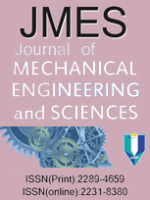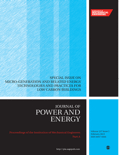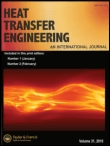
Acta Mechanica et Automatica
Scope & Guideline
Unlocking New Horizons in Mechanical and Control Research
Introduction
Aims and Scopes
- Fluid Dynamics and Heat Transfer:
Research in this area focuses on the behavior of fluids under various conditions, including nanofluids, MHD (Magnetohydrodynamics), and heat transfer mechanisms. Studies often involve both experimental and numerical methods. - Biomechanics and Medical Applications:
This scope includes the application of mechanical principles to biological systems, addressing topics like human gait analysis, biomechanical modeling, and non-invasive medical diagnostics. - Robotics and Automation:
The journal features advancements in robotic systems, automation technologies, and control systems, emphasizing the integration of machine learning and intelligent algorithms. - Material Science and Mechanical Properties:
Research here investigates the mechanical behavior of materials, including experimental analysis of materials under stress, fatigue behavior, and the influence of various treatments on material properties. - Mathematical Modelling and Computational Techniques:
This encompasses the use of advanced mathematical techniques to model complex systems, including fractional calculus, numerical simulations, and optimization approaches for engineering problems. - Thermal and Energy Systems:
Focus is on the thermal performance of systems, including renewable energy technologies, thermal storage solutions, and thermodynamic analysis.
Trending and Emerging
- Nanotechnology and Nanofluids:
Recent publications indicate a surge in studies involving nanofluids, exploring their unique thermal properties and applications in heat transfer systems, which is critical for enhancing energy efficiency. - Machine Learning and AI in Automation:
There is an increasing trend towards integrating artificial intelligence and machine learning techniques in automation systems, particularly in robotics and predictive maintenance. - Sustainable and Renewable Energy Solutions:
Research focused on renewable energy sources, energy-efficient systems, and thermal management solutions has gained prominence, reflecting the global push towards sustainability. - Advanced Computational Methods:
Emerging techniques in computational modeling, including fractional calculus and multi-scale modeling, are increasingly featured, highlighting the need for sophisticated analysis in engineering problems. - Biomechanical and Ergonomic Studies:
The focus on biomechanics in workplace settings and healthcare applications is rising, driven by the need for improved human-machine interaction and safety evaluations.
Declining or Waning
- Traditional Mechanical Engineering:
Topics such as basic machine design and conventional manufacturing processes have seen a decline as more emphasis is placed on advanced materials and automation technologies. - Static Structural Analysis:
Research focusing solely on static analysis of structures without considering dynamic or real-time applications has diminished, reflecting a broader trend towards dynamic and complex modeling. - Basic Control System Theory:
While control systems remain relevant, research specifically centered on traditional control theory without integration of modern algorithms or adaptive techniques has become less frequent.
Similar Journals

Journal of Mechanical Engineering and Sciences
Elevating Research in Mechanical Engineering and BeyondThe Journal of Mechanical Engineering and Sciences (ISSN: 2289-4659, E-ISSN: 2231-8380), published by UNIV MALAYSIA PAHANG, is a prominent open access journal established in 2011, dedicated to advancing the field of mechanical engineering and associated sciences. Covering a wide array of topics from industrial manufacturing processes to computational mechanics, the journal serves as a vital platform for researchers, professionals, and students to disseminate innovative findings and methodologies. With impressive Scopus rankings, including a place in the 60th percentile for Industrial and Manufacturing Engineering, the journal holds a significant position among its peers, facilitating global academic discourse. Located in Kuantan, Pahang, Malaysia, the journal emphasizes accessibility and collaboration within the engineering community, encouraging submissions that contribute to both theoretical and applied aspects of mechanical engineering.

PROCEEDINGS OF THE INSTITUTION OF MECHANICAL ENGINEERS PART A-JOURNAL OF POWER AND ENERGY
Elevating Standards in Power and Energy ResearchPROCEEDINGS OF THE INSTITUTION OF MECHANICAL ENGINEERS PART A-JOURNAL OF POWER AND ENERGY, published by SAGE PUBLICATIONS LTD, is a pivotal journal dedicated to advancing the fields of mechanical engineering and energy technology. With a history spanning from 1983 to 2024, this journal provides a respected platform for researchers and practitioners to disseminate findings that address contemporary challenges in power generation, energy efficiency, and sustainable engineering practices. As evidenced by its quarter ranking in Q3 within the categories of Energy Engineering and Power Technology, and Mechanical Engineering, it serves as a significant resource for academics aiming to enhance their understanding and explore innovation in these critical areas. While currently not an open-access journal, the research published here is invaluable for both ongoing education and professional practice, making it an essential read for anyone engaged in the engineering disciplines.

JOURNAL OF POROUS MEDIA
Advancing the Frontiers of Porous Media ResearchJOURNAL OF POROUS MEDIA is a prominent interdisciplinary journal published by Begell House Inc, focusing on the advancement of knowledge related to porous media across various fields, including Biomedical Engineering, Condensed Matter Physics, Materials Science, and Mechanical Engineering. With its ISSN 1091-028X and E-ISSN 1934-0508, this journal serves as a vital platform for researchers and professionals to disseminate groundbreaking findings and foster collaboration within the scientific community. The journal is ranked in the Q2 and Q3 quartiles in multiple categories as of 2023, demonstrating a notable standing in Scopus rankings across several engineering and physics disciplines. Though not an open-access journal, it provides essential insights and advancements within the field of porous media research, encouraging innovative exploration and practical applications in real-world scenarios. Published from 1998 through 2024, JOURNAL OF POROUS MEDIA is an invaluable resource for students, researchers, and industry experts seeking to deepen their understanding of complex porous systems.

HEAT TRANSFER ENGINEERING
Elevating standards in thermal engineering research and practice.HEAT TRANSFER ENGINEERING is a leading international journal published by Taylor & Francis Inc, dedicated to advancing the field of heat transfer and thermal engineering. With a strong focus on the key aspects of Condensed Matter Physics, Fluid Flow and Transfer Processes, and Mechanical Engineering, this journal covers a comprehensive range of topics from experimental studies to theoretical analysis, aiming to foster innovative research and practical applications. Since its inception in 1979 and continuing through 2024, the journal has established itself as an essential resource for researchers and industry professionals alike, reflected in its solid rankings within Scopus—holding a Q2 quartile classification in multiple engineering disciplines. Although not open access, the journal ensures broad accessibility through institutional subscriptions, making cutting-edge research readily available. With its rigorous peer-review process and commitment to quality, HEAT TRANSFER ENGINEERING plays a crucial role in shaping the future of thermal management solutions and engineering practices.

Journal of Nanofluids
Exploring the Future of Fluid Dynamics and NanotechnologyJournal of Nanofluids, published by AMER SCIENTIFIC PUBLISHERS, is a leading international journal dedicated to the burgeoning field of nanofluid technology which bridges the areas of fluid dynamics and nanotechnology. With an ISSN of 2169-432X and E-ISSN of 2169-4338, this journal has established itself as a valuable resource for researchers and professionals in Mechanical Engineering and Chemical Engineering, particularly in the domains of fluid flow and transfer processes. Its prestigious standing is reflected in the 2023 Scopus rankings, positioning it in the 79th percentile for Mechanical Engineering and the 78th percentile for Fluid Flow and Transfer Processes. Although coverage has been discontinued in Scopus since 2021, the journal maintains a Q2 category ranking in both relevant fields, emphasizing its commitment to high-quality and impactful research dissemination. This journal aims to foster innovation and collaboration among scientists and engineers worldwide, providing a platform for groundbreaking research, reviews, and discussions on nanofluids, their properties, and applications. As an essential addition to the library of any researcher or student vested in advanced fluid dynamics, the Journal of Nanofluids serves as a pivotal conduit for advancing knowledge and technology in this exciting and evolving field.

FDMP-Fluid Dynamics & Materials Processing
Unveiling the Dynamics Behind Material TransformationFDMP-Fluid Dynamics & Materials Processing, published by TECH SCIENCE PRESS, stands as a significant contribution to the field of materials science, specifically focusing on the intricate relationships between fluid dynamics and material processing. With an ISSN of 1555-256X and an E-ISSN of 1555-2578, this journal offers an open-access platform where researchers can disseminate their work broadly, promoting collaboration and innovation among professionals and students alike. Established in 2007 and continuously evolving through to 2024, the journal is classified in the Q4 category of materials science, ranking at #347 out of 463 in the Scopus database, signifying its niche yet crucial role in the academic community. By focusing on the dynamic interplay between fluid behavior and material properties, FDMP addresses contemporary challenges and advances in material processing techniques. The journal plays a pivotal role for academics and industry professionals seeking to push the boundaries of knowledge and application in materials science.

Transactions of the Korean Society of Mechanical Engineers B
Driving excellence in mechanical engineering scholarship.Welcome to the Transactions of the Korean Society of Mechanical Engineers B, a pivotal journal dedicated to advancing the field of mechanical engineering. Published by the esteemed Korean Society of Mechanical Engineers, this journal serves as a platform for the dissemination of innovative research and practical applications in mechanical engineering and related disciplines. With a focus on fostering knowledge exchange and collaboration, the journal publishes original research articles, reviews, and technical notes that contribute to the understanding and evolution of mechanical systems and technologies. The Transactions of the Korean Society of Mechanical Engineers B, which has been in circulation since 2007 and spans through 2024, is categorized within the Q4 quartile of mechanical engineering rankings and is indexed by Scopus, making it a valuable resource for researchers and professionals aiming to stay abreast of the latest developments in the field. Although it is not open access, its rigorous peer-review process ensures the integrity and quality of the published work, making it essential reading for academics and practitioners alike.

Mechanika
Exploring New Dimensions in MechanicsMechanika is a prominent open-access journal published by Kaunas University of Technology in Lithuania, with an ISSN of 1392-1207 and E-ISSN 2029-6983. Since its transition to open access in 2007, the journal has successfully facilitated the dissemination of vital research findings within the field of condensed matter physics, carving a niche for itself in a competitive academic landscape. Despite currently being categorized in the Q4 quartile for its impact in this area, Mechanika aims to foster advancements by providing a platform for innovative studies, reviews, and applications. As researchers, professionals, and students engage with its content, they will find an array of studies that push the boundaries of understanding in mechanics and related disciplines. Situated in the vibrant academic milieu of Kaunas, Mechanika is committed to quality, accessibility, and fostering scientific dialogue among the global academic community.

Journal of the Brazilian Society of Mechanical Sciences and Engineering
Bridging theory and application in engineering excellence.The Journal of the Brazilian Society of Mechanical Sciences and Engineering, published by Springer Heidelberg, is a pivotal platform dedicated to disseminating cutting-edge research in the realm of mechanical sciences and engineering. With an ISSN of 1678-5878 and an E-ISSN of 1806-3691, this journal showcases innovative findings across various categories, including Aerospace Engineering, Automotive Engineering, and Industrial and Manufacturing Engineering. Notably positioned in the Q2 and Q3 quartiles of its fields as of 2023, the journal highlights the importance of rigorous scientific inquiry, contributing significantly to the understanding and application of engineering principles globally. With a Scopus rank reflecting strong performance in multiple engineering disciplines, this journal serves as an invaluable resource for researchers, professionals, and students seeking to advance their knowledge and explore the frontiers of mechanical sciences. The journal covers a broad range of topics and aims to facilitate collaboration and synergy among experts in the field, enhancing the overall impact of mechanical engineering research.

Propulsion and Power Research
Driving Progress in Fluid Flow and Transfer Processes.Propulsion and Power Research, published by KEAI PUBLISHING LTD, is a leading Open Access journal that has been advancing the field of propulsion and power systems since its inception in 2012. With its commitment to fostering scientific discourse and innovation, the journal has gained a prominent position within academia, achieving a Q1 ranking in multiple categories such as Aerospace Engineering, Automotive Engineering, and Fluid Flow and Transfer Processes as of 2023. With an impressive ranking of #18 out of 153 in Aerospace Engineering and consistent recognition in the Scopus rankings, the journal explores critical advancements and research findings that propel the industry forward. As an Open Access publication, it ensures that groundbreaking research is readily available to a broad audience, enhancing collaboration between researchers, practitioners, and students. The journal's scope encompasses a wide range of topics within propulsion and energy solutions, making it an essential resource for anyone keen on discovering significant developments in this dynamic field.